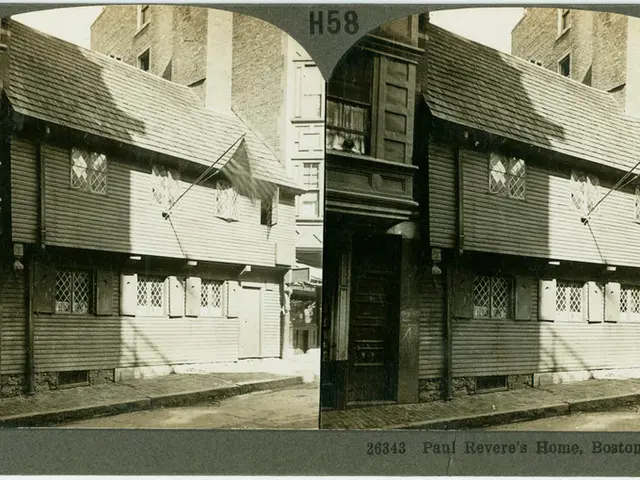Jane Austen: A Writer Offering Social Insights
Jane Austen, the Sassy Social Commentator
Embodying acerbic wit and keen insights, Jane Austen stands as a titan in the literary realm. Born in 1775, she's still captivating readers around the globe with her epic tales. But what sets her apart from the rest? It's not just her enticing narratives or captivating characters – it's her scathing social commentary that's earned her a special place. Through novels such as "Pride and Prejudice," "Sense and Sensibility," and "Emma," Austen masterfully tackles themes of class, marriage, gender, and economics with a subtlety and finesse that's hard to beat.
Her works serve up more than just a good read; they offer a magnifying glass to the complex social norms of 18th-century England. By weaving her criticisms into the lives of her characters, Austen ensures that her books are as edifying as they are enjoyable. Buckle up as we delve into the life, works, and legendary influence of Jane Austen.
The Early Life and Inspirations Behind the Icon
Born into a moderately well-off family in Steventon, Hampshire, Austen was the seventh of eight children. Her father, a clergyman, and her mother, from a distinguished family, provided Austen with a close-knit community and a large household where literary pursuits were encouraged. Austen's education mainly took place at home, supplemented by a brief stint at boarding school. Despite the educational restrictions faced by women during her time, Austen devoured books, from historical texts to contemporary novels. These works greatly impacted her writing style and thematic focus. Austen maintained a close bond with her sister Cassandra, her confidante and advisor, who also significantly influenced her works.
Her Notable Works and Social Commentary
Austen's novels skillfully blend romantic plots with social critique, offering readers a glimpse into the intricate workings of her time. "Pride and Prejudice" stars as her most renowned work, featuring hot-headed Elizabeth Bennet and brooding Mr. Darcy. On the surface, it's a love story, but beneath the romantic facade, Austen delves into class prejudice, marriage, societal norms, and financial stability, criticizing these systems through her fiction.
"Sense and Sensibility" contrasts the characters of Elinor and Marianne Dashwood to explore the balance between rationality and emotions, revealing the financial challenges faced by women who lacked male protection. In "Emma," Austen comments on the social structures that limit women's roles, depicting the evolution of matchmaking protagonist Emma Woodhouse from meddlesome to self-aware.
Each of Austen's novels functions as a sociocultural critique of the specific constraints and pressures faced during her era, particularly for women, providing a detailed portrait of the unique challenges they faced.
Austen's Unique Narrative Style
To discuss Austen without mentioning her unique narrative style would be a disservice. She employed free indirect discourse, a technique that seamlessly combines first-person and third-person perspectives, allowing readers intimate access to her characters' thoughts. This approach simultaneously enriches her characterizations and deepens her social critiques.
Austen's novels are also marked by their snark and irony. By employing humor to critique societal norms and reveal human absurdities, she makes her criticisms more digestible for her readers. Austen's sharp dialogues brim with layers of meaning, revealing the true nature of her characters and the society in which they exist.
Though noted for her detached narrative voice, Austen's detachment allows her to maintain an unbiased viewpoint while delivering biting social commentary. This unique blend of narrative innovation, wit, and irony ensures her works never grow old.
Gender and Feminism in Austen's Works
Though Austen's novels predate modern feminism, her works consistently engage with gender politics and the limited roles available to women. Her female characters often grapple with societal expectations related to marriage and financial dependency. Characters like Elizabeth Bennet and Emma Woodhouse defy those constraints, serving as emblems of female intelligence and independence.
"Northanger Abbey" follows the transformation of naive Catherine Morland from innocence to self-awareness, a subtle critique of the limited education and opportunities afforded to women during her time. "Persuasion", too, centers around Anne Elliot who, against societal norms, defies expectations and finds a second chance at love. Although overt feminist statements are rare, the recurring theme of women exerting agency within their limited parameters is clear.
The Lasting Legacy of Jane Austen
Jane Austen's mark on both literature and culture persists well beyond her lifetime. Her novels have been continuously in print since their original publication, a testament to their ongoing appeal. Film, television, and theater adaptations have introduced her stories to new generations and diverse audiences, bringing her world to life. Each adaptation offers a fresh interpretation of her narratives, often emphasizing various social issues.
As modern readers find parallels between Austen's characters' challenges and contemporary societal issues, her works remain relevant today. From economic insecurity, the role of women, marriage, to social power, Austen's insights into human behavior and social norms resonate still.
Scholars, feminists, and fans continue to dissect Austen's works, discovering new layers of meaning and significance. Her impact on modern literature is evident, as many authors credit her for shaping the genre of the novel and pushing the boundaries of social critique through fiction.
In conclusion, Jane Austen's body of work is more than a collection of romantic yarns; it's a multi-layered examination of social structures and human nature. Through her biting wit, innovative narrative techniques, and keen social observations, she provides readers with a window into the intricacies of 18th and early 19th-century English society. Her subtle yet powerful critiques of gender roles, class structures, and economic issues have ensured her status as a groundbreaking figure in literary history.
As we continue to revisit Austen's works, we are reminded of the power of literature to reflect, critique, and ultimately shape society. Her enduring legacy is a testament to the power of thoughtful, intelligent, and beautifully crafted storytelling on our understanding of the world and ourselves.
- Austen's work, such as 'Pride and Prejudice', 'Sense and Sensibility', and 'Emma', not only offers captivating narratives and unforgettable characters but also delves into the realms of economics, gender, and social norms, demonstrating a unique blend of fashion-and-beauty, education-and-self-development, and personal-growth.
- Jane Austen, the influential author, masterfully employs free indirect discourse and irony, providing readers with enthralling dialogues that brim with layers of meaning, highlighting her characters' true nature and the societal norms they navigate in her books.
- The literary genius of Jane Austen extends beyond the 18th and 19th centuries, as her works tackle timeless themes like gender and feminism, social critique, and financial security, showcasing the challenges faced by her female characters and resonating with contemporary readers facing similar issues.
- Austen's books serve as a launchpad for discussions related to pop-culture, shining a light on the lives of celebrities who now resemble her characters and interrogating the role of societal pressures in shaping self-identity.
- From books to film, television, and theater, Jane Austen's works have been, and continue to be, interpreted and adapted for various platforms, allowing her epic tales to endure through the shifting sands of time, while simultaneously addressing the relevant issues of the present day.







